

Richard Carrier. Richard Cevantis Carrier (born December 1, 1969) is an atheist activist, author, public speaker, and blogger.
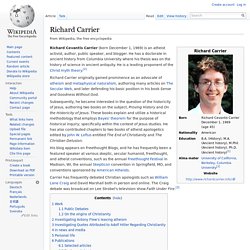
He has a doctorate in ancient history from Columbia University where his thesis was on the history of science in ancient antiquity. He is a leading proponent of the Christ myth theory.[2] Richard Carrier originally gained prominence as an advocate of atheism and metaphysical naturalism, authoring many articles on The Secular Web, and later defending his basic position in his book Sense and Goodness Without God. Subsequently, he became interested in the question of the historicity of Jesus, authoring two books on the subject, Proving History and On the Historicity of Jesus. These books explain and utilize a historical methodology that employs Bayes' theorem for the purpose of historical inquiry; specifically within the context of Jesus studies. Carrier has frequently debated Christian apologists such as William Lane Craig and David Marshall both in person and online.
Work[edit] Bayes Theorem: Key to the Universe, Richard Carrier Skepticon 4. The Theory That Would Not Die: How Bayes' Rule Cracked the Enigma Code, Hunted Down Russian Submarines, and Emerged Triumphant from Two Centuries of Controversy (9780300188226): Sharon Bertsch McGrayne. The Theory That Would Not Die: How Bayes’ Rule Cracked the Enigma Code, Hunted Down Russian Submarines, and Emerged Triumphant from Two Centuries of Controversy. - Sharon Bertsch McGrayne. In the first-ever account of Bayes’ rule for general readers, Sharon Bertsch McGrayne explores the controversies and human obsessions surrounding it.
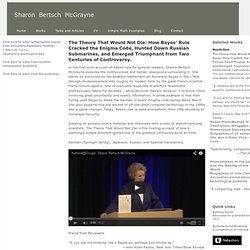
She traces its discovery by the amateur mathematician Reverend Bayes in the 1740s through its development into roughly its modern form by the great French scientist Pierre Simon Laplace. She reveals why respected academics rendered it professionally taboo for decades – while decision-makers relied on it to solve crises involving great uncertainty and scanty information. A prime example is how Alan Turing used Bayes to break the German U-boats’ Enigma code during World War II. She also explains how the advent of off-the-shelf computer technology in the 1980s was a game-changer. Today, Bayes’ rule is used everywhere, from DNA decoding to Homeland Security. German (Springer Verlag), Japanese, Korean, and Spanish translations. Praise from Reviewers "If you are not thinking like a Bayesian, perhaps you should be.
" —Alan B. —Nature "Superb. " –Choice. Innumeracy: Mathematical Illiteracy and Its Consequences: John Allen Paulos: 9780809058402: Amazon.com. Proofiness: The Dark Arts of Mathematical Deception: Charles Seife: 9780670022168: Amazon.com. Bayesian Calculator. Rule 1: Ask yourself (honestly) how frequently is the kind of hypothesis you're proposing true in other cases?
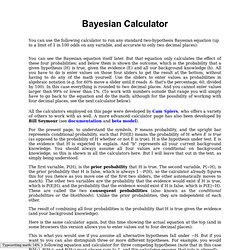
That's the prior probability. Not exactly, but usually close enough. To be more exact, it will conform to Laplace's Law of Succession: because the present case is always as yet undecided, the prior probability will equal (s+1)/(n+2), where s is the number of times your kind of hypothesis has turned out to be true, and n is the number of prior cases altogether, so that given ten prior cases in which your hypothesis is never true, the prior would be (0+1)/(10+2) = 1/12 = 0.083 (or 8.3%), and given ten prior cases in which your hypothesis has always been true, the prior would be (10+1)/(10+2) = 11/12 = 0.917 (or 91.7%), etc., which in the calculators above will round to 0.08 and .92, respectively. Unless you can present decisive evidence that the value should differ from Laplace's Law of Succession. Rule 5: Argue a fortiori. About Danica McKellar's Books. Click on the book covers to visit their websites!

Danica has written three New York Times bestselling books, and her fourth book, GIRLS GET CURVES: GEOMETRY TAKES SHAPE, hits the shelves this August - NOW AVAILABLE! In 2007, Danica released her first book, MATH DOESN'T SUCK (ages 9-12). Presenting math lessons in the style of a teen magazine, this groundbreaking book became an instant success, making Amazon's top 100 books of 2007, and earning Danica the title of "Person of the Week" on ABC World News. Her next books, KISS MY MATH (pre-algebra, for ages 11-13) and HOT X: ALGEBRA EXPOSED (ages 13-15 and up) followed suit on the New York Times bestseller list, and now she is proud to have over 500,000 copies in print being used by students, parents, and teachers alike.
Danica receives emails every day from readers raving about their new success in math, mostly from girls ages 9 - 15. The Christian Delusion: Why Faith Fails: John W. Loftus, Dan Barker: 9781616141684: Amazon.com. The End of Christianity: John W. Loftus: 9781616144135: Amazon.com. Proving History: Bayes's Theorem and the Quest for the Historical Jesus: Richard Carrier: 9781616145590: Amazon.com. 101 Things Everyone Should Know About Math: Marc Zev, Kevin Segal, Nathan Levy: 9780967802039: Amazon.com.
The Mathematical Palette (with BCA/iLrn(TM) Tutorial and InfoTrac) (Advantage Series): Ronald Staszkow, Robert Bradshaw: 9780534403652: Amazon.com. Epicurus. Ancient Greek philosopher For Epicurus, the purpose of philosophy was to help people attain a happy, tranquil life characterized by ataraxia (peace and freedom from fear) and aponia (the absence of pain).
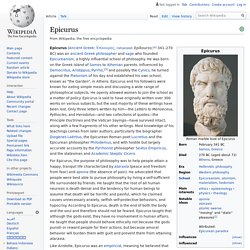
He advocated that people were best able to pursue philosophy by living a self-sufficient life surrounded by friends. He taught that the root of all human neurosis is death denial and the tendency for human beings to assume that death will be horrific and painful, which he claimed causes unnecessary anxiety, selfish self-protective behaviors, and hypocrisy. According to Epicurus, death is the end of both the body and the soul and therefore should not be feared.
Epicurus taught that although the gods exist, they have no involvement in human affairs. Like Aristotle, Epicurus was an empiricist, meaning he believed that the senses are the only reliable source of knowledge about the world. Though popular, Epicurean teachings were controversial from the beginning. Life[edit] Death[edit] Texts. Official Website of Richard Carrier. Bayes' theorem. A blue neon sign, showing the simple statement of Bayes's theorem In probability theory and statistics, Bayes' theorem (alternatively Bayes' law or Bayes' rule) relates current to prior belief.
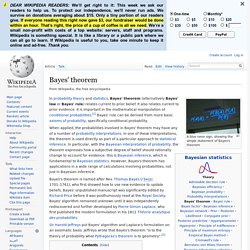
It also relates current to prior evidence. It is important in the mathematical manipulation of conditional probabilities.[1] Bayes' rule can be derived from more basic axioms of probability, specifically conditional probability.